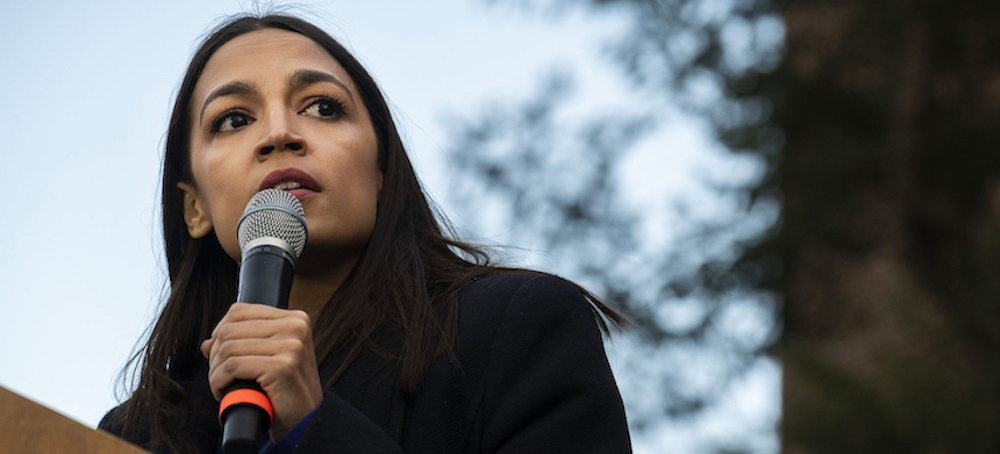The Progressives Have Already Won
Russell Berman The Atlantic Alexandria Ocasio-Cortez. (photo: Brittany Greeson/Getty Images)
Alexandria Ocasio-Cortez. (photo: Brittany Greeson/Getty Images) The Progressives Have Already Won
Russell Berman The Atlantic
They have President Joe Biden on their side. But will their ideological victory be empty?
The president’s gesture of support underscored the political reality that is driving the tense negotiations on Capitol Hill: In the battle for ideological supremacy in the Democratic Party, the progressives have already won. Biden was indeed a proud moderate during his three and a half decades as a senator, but he has fallen in firmly with the progressives as president. He’s embraced the agenda championed by the likes of his former rivals Bernie Sanders and Elizabeth Warren—tackling climate change; creating a new child-care tax credit; expanding the government’s role in health care; endorsing universal pre-K, free community college, and paid family leave—and made it his own. The moderates in the House and Senate are balking at the size and scope of Biden’s plan, and, still, the president is siding with the progressives. He used last week’s meetings to reassure lawmakers like Jayapal and to pressure centrists such as Senators Joe Manchin of West Virginia and Kyrsten Sinema of Arizona, who have opposed the $3.5 trillion price tag of the Democrats’ proposal but have yet to make a counteroffer of their own.
The progressives’ intraparty victory could wind up being an empty one in the end. With the Democrats’ slim majorities in Congress, the moderates have the votes to sink all but the relatively modest infrastructure portion of Biden’s agenda, which passed the Senate in a bipartisan vote this past summer. Embittered progressives could then reject the infrastructure bill, leaving the party with a catastrophic whiff heading into its already-uphill effort to hold Congress in next year’s midterm elections. “Most people feel that progressives have gotten rolled over and over again because they haven’t been able or willing to leverage their power,” Jayapal told me.
At minimum, the moderates are likely to scale back the much larger package that Democrats need to pass without help from Republicans. But that prospect is not as frightening to progressives as it might have been in past years. Because of their early success, the second bill is so broad that even if moderates were to cut its cost in half, Biden could still lay claim to legislative accomplishments that, when added to the $1.9 trillion American Rescue Plan enacted this spring, are more significant than any Democratic president of the past half century. Manchin opposes the breadth of the bill’s climate provisions, and House moderates have blocked a plan aimed at lowering the cost of prescription drugs. The Senate parliamentarian has nixed a proposal to include a pathway to citizenship for undocumented immigrants. Yet even if those measures are watered down or scrapped, what’s left in the bill would still dramatically increase federal support for child care, early education, college, and health care.
“Progressives are in the driver’s seat here,” says Joseph Geevarghese, the executive director of Our Revolution, the advocacy group that grew out of Senator Sanders’s 2016 presidential campaign. “Are we going to get everything we want? No. That’s just the reality of politics. But if you look at where we are compared to the Obama era, it’s transformational.”
The dynamic playing out under Biden is a direct result of the lessons Democrats—both elected leaders and progressive activists—learned from their experience the last time the party controlled both chambers of Congress and the White House. The Democratic majorities in 2009–10 were far larger, but each of the major legislative initiatives of that era started closer to the political center as compromises designed to attract Republican votes. Democrats held back the cost of their initial stimulus package in 2009 and loaded it up with tax cuts at the expense of bigger investments in other areas such as infrastructure. They modeled the Affordable Care Act on a law that Mitt Romney signed as the GOP governor of Massachusetts. The climate bill that never passed the Senate adopted a market-based cap-and-trade program instead of a simpler carbon tax.
On all of those proposals, moderates outmaneuvered progressives without succeeding in winning over Republicans. Now progressives are driving the policy agenda, and have a Democratic president they can claim as an ally. “He was not my candidate in the election,” Jayapal, who backed Sanders in the 2020 primary, said of Biden. “But what he has laid out in this Build Back Better Plan is extremely progressive, and what he has supported as we’ve gone through is extremely progressive.” Even so, Jayapal isn’t taking any chances. As chair of the Congressional Progressive Caucus, she has led the group in adopting a more confrontational posture toward the party leadership. Progressives in the House have threatened to vote down the Senate-approved bipartisan infrastructure bill if the broader Democratic bill does not pass first.
The most consequential move by progressives, however, might prove to be not their tactical positioning now but their success in winning—and keeping—Biden’s support for their agenda. When the president gave Jayapal a copy of his speech last week, he was demonstrating to her that he would fight for their agenda as it hangs on the edge, that their vision remains his vision. Jayapal asked him to sign it, and he did. An autographed speech is not the presidential signature that progressives ultimately want, but for the moment, it’s the best they can get.
